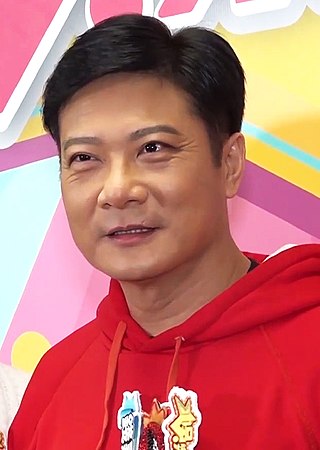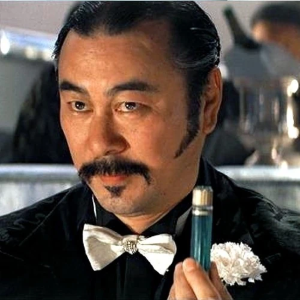Related Research Articles

A Better Tomorrow is a 1986 Hong Kong action film directed, co-written, and co-produced by John Woo; co-produced by Tsui Hark; and starring Ti Lung, Leslie Cheung and Chow Yun-fat. The film had a profound influence on Hong Kong action cinema, and has been recognised as a landmark film credited with setting the template for the heroic bloodshed genre, with considerable influence on both the Hong Kong film industry and Hollywood.

Samuel "Sammo" Hung Kam-bo is a Hong Kong actor, martial artist, film producer and director, known for his work in martial arts films, Hong Kong action cinema, and as a fight choreographer for other actors such as Jackie Chan.
Heroic bloodshed is a genre invented by Hong Kong action cinema revolving around stylized action sequences and dramatic themes, such as brotherhood, duty, honour, redemption, and violence that has become a popular genre used by different directors worldwide. The term heroic bloodshed was coined by editor Rick Baker in the magazine Eastern Heroes in the late 1980s, specifically referring to the styles of directors John Woo and Ringo Lam. Baker defined the genre as "a Hong Kong action film that features a lot of gun play and gangsters rather than kung fu. Lots of blood. Lots of action." Heroic bloodshed films often feature gun fu action sequences.
Rei Sakuma is a Japanese actress, voice actress, singer and narrator from Tokyo, Japan. She is best known in Japan for her voice work in the long running children's series Soreike! Anpanman; her most famous role in the English-speaking world, however, is probably as the Chinese Amazon Shampoo in Ranma ½. Other popular roles include Yōko Sakakibara in Azuki-chan, Mariemaia Khushrenada in New Mobile Report Gundam Wing: Endless Waltz, My Melody in Onegai My Melody and Mini-Doras in the Doraemon 1979 anime series.

Tommy Tam Fu-wing, known professionally by his stage name Ti Lung, is a Hong Kong actor, known for his numerous starring roles in a string of Shaw Brothers Studio's films, particularly The Duel, The Blood Brothers, Clans of Intrigue, The Avenging Eagle, The Sentimental Swordsman and its sequel, as well as the classic John Woo film A Better Tomorrow and its sequel.

Jimmy Johnson is an American bass guitarist best known for his work with James Taylor, Allan Holdsworth, and Flim & the BB's. Raised in a rich musical environment, his father was a 47-year member of the Minnesota Orchestra's bass section, his mother a piano teacher and accompanist, and his brother Gordon is also a professional bassist.

Chin Ka-lok, sometimes credited as Chin Kar-lok, is a Hong Kong actor, action choreographer, and television presenter.
Lau Kar-leung was a Chinese actor, filmmaker, choreographer, and martial artist from Hong Kong. Lau is best known for the films he made in the 1970s and 1980s for the Shaw Brothers Studio. His most famous works include The 36th Chamber of Shaolin starring Gordon Liu as well as Drunken Master II starring Jackie Chan.

Sylvia Chang is a Taiwanese actress, singer, director, screenwriter and producer. In 1992, she served as a jury member at the 42nd Berlin International Film Festival. In June 2018, she was invited to become a member of the Academy of Motion Picture Arts and Sciences. In the same year, she served as a jury member at the 75th Venice International Film Festival.

William Tung Biu was a Hong Kong actor and horse racing commentator. Tung started off as a jockey with his family racing horse stable. He was then recruited to become a horse racing commentator. Due to his fame, he was invited to act in many movies beginning in the late 1970s. He appeared in several films with Jackie Chan during the 1980s and 1990s, such as playing Inspector "Uncle" Bill Wong in the original Police Story series, including his final movie role in Police Story 4: First Strike in 1996. Tung retired from horse racing commentating in 2000. Tung died in 2006 of lung failure.

Stanley Fung Shui-fan is a Hong Kong actor and film director known for playing comedic roles. He was one of the Lucky Stars.
Max Mok is a Hong Kong actor and singer. Mok was recruited by the Shaw Brothers Studio and has been a major film star since the 1980s. Mok is perhaps best known as Leung Foon in Once Upon a Time in China II, III, IV and V, after replacing Yuen Biao who was in the first film. In the Philippines, he is known as Bronson Lee.
Regina Kent was a Hong Kong actress who acted in some notable Hong Kong films in the 1980s.
Barry Wong, also known as Wong Ping-Yiu (黃炳耀), was a Hong Kong screenwriter, film producer and actor. He was hailed as one of the most prolific screenwriters of Hong Kong cinema penning scripts for some of the top filmmakers and actors during the 1980s and early 1990s. Wong died from a heart attack on 16 October 1991 while on a trip to Berlin, Germany.

Roy Chiao Hung was a Hong Kong actor. Nicknamed "the Lion of Cinema" for his athletic physical stature and powerful screen presence, he was a popular leading man throughout the 1950s and '60s, and continued his acting career well into the 1990s. He was an early star of wuxia films associated with the Hong Kong New Wave, thanks to his roles in A Touch of Zen (1971) and The Fate of Lee Khan (1973), both directed by King Hu.
Herman Kwan Hoi-San was a Hong Kong actor. His English name was Herman Kwan. Kwan started off as a Cantonese opera actor in street theatre before joining New Voice Opera Troupe (新聲劇團). He also started singing for early Hong Kong film soundtracks and moved on to act in films, mostly adaption of opera in Cantonese. He became famous and acted in many lead roles. When Hong Kong films started to move towards Mandarin, Kwan's career faltered and joined TVB and acted in various roles. Directors and filmmakers rediscovered his talent and cast him in many supporting roles in films. In 2001, Kwan suffered a stroke and was left mute and paralysed. He died in 2006.
Kwan Shan was a Hong Kong film actor. Kwan appeared as a romantic lead actor in Mandarin-language films created in Hong Kong, especially during the 1960s. His roles included several Shaw Brothers Studio productions.
Phillip Ko-fei was a Hong Kong based actor, screenwriter and film director.
Chung Fat is a Hong Kong-based actor, choreographer, producer, and director. He primarily stars in jiangshi fictions and martial art movies.
Fung Hak-on was a Hong Kong actor. He appears in Hong Kong films since the 1960s until mid 2010s.
References
- ↑ 温情八卦 (1970-01-01). "张国荣喜欢的女演员,落魄拍三级片,隐退23年嫁富商". k.sina.cn. Retrieved 2024-01-27.